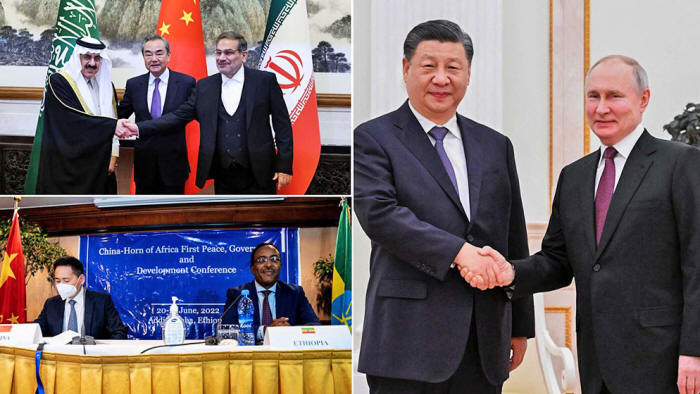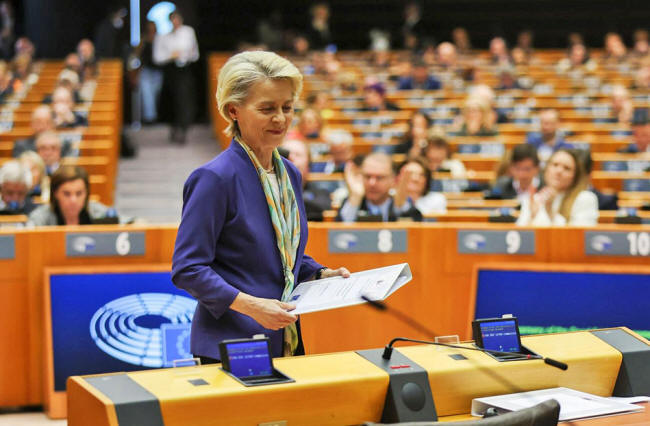|

by Laurence Norman
in Berlin and Kim Mackrael in Brussels
March 30,
2023
from
StrategicStudyIndia Website
Original Source

China is arguably a modern-day Technocracy, originally
groomed and taught by
Zbigniew Brzezinski, a
co-founder of the
Trilateral Commission
in 1973.
When
China entered the world economic stage, it was not
taught principles of free market economics, but rather
Technocracy, or the
Commission's self-proclaimed
New International Economic Order.
It's no surprise that China is emerging as the global
leader just as the Trilateral Commission has declared
2023 to be "year
one" of the new global order.
China will dominate, just as the Commission predicted in
1973.
Source
BRUSSELS
China is seeking a new
international order with Beijing as
the dominant player, and the
European Union must be more assertive in defending its security and
economic interests, including possible EU-wide controls on outbound
investment, the bloc's top official said Thursday.
In a speech Thursday ahead of her trip to China alongside French
President Emmanuel Macron, set to take place next week,
European Commission President
Ursula von der Leyen said the
EU must continue engaging with Beijing but needs a strategy for
"de-risking" its relationship and dependencies on China.
She also tied the future of Europe's links with China to Beijing's
actions over the war in Ukraine and effectively called a halt to
remaining hopes of enacting a 2020 EU-China investment agreement.
Citing China's backing for Russia in the Ukraine war, its
Belt and Road global
infrastructure initiative and its assertiveness in multilateral
bodies, Ms. von der Leyen said the Chinese Communist Party's,
"clear goal is a
systemic change of the international order with China at its
center."
"One, where individual rights are subordinated to national
sovereignty, where security and economy take prominence over
political and civil rights",
...she said in a speech
hosted by two European think tanks, one of which, the
Mercator Institute for China Studies,
has been sanctioned by Beijing.
Ms. von der Leyen's comments come at a pivotal moment in Europe's
relations with China, which
have been frayed by years of
economic spats and, since
Russia's 'invasion' of Ukraine, by
Chinese President Xi Jinping's close ties with Russian
President Vladimir Putin.
Facing crosscutting pressures from Washington to harden its line
toward Beijing and from China not to put its large economic
interests at risk, most EU countries are keen to continue to engage
with Beijing and not to be drawn directly into a confrontation
between the U.S. and China.
The EU and China do
close to 1 billion Euros, equivalent to roughly $1.1 billion, in
trade a day, and China is the EU's biggest import
market...
The coming trip by Mr.
Macron and Ms. von der Leyen is one of a number by leading European
officials to China in coming weeks.
Officials say among the key goals is to prod Chinese leaders to take
a more balanced approach to the war in Ukraine and warn that
any decision by Beijing to support
Russia militarily in Ukraine would have serious consequences for
ties.

European Commission President Ursula von der Leyen
says
Beijing's actions over the war in Ukraine
will be
a determining factor for EU-China ties.
PHOTO:
OLIVIER HOSLET/SHUTTERSTOCK
Ms. von der Leyen spelled out that message on Thursday.
She said that,
China's relations
with Russia have grown tighter despite what she called Russia's
"atrocious and illegal invasion of Ukraine," even while Beijing
is emerging as the dominant partner...
Referring to
China's talk of a peace plan, she
said that any proposal,
"which would in
effect consolidate Russian annexations" of Ukrainian territory
"is simply not a viable plan."
"How China continues to interact with Putin's war will be a
determining factor for EU-China relations," she added.
China continues to be a
vital trading partner, Ms. von der Leyen said.
But she warned the
economic relationship between China and Europe is becoming
increasingly unbalanced and that China's,
"explicit fusion of
its military and commercial sectors" poses risks to European
security.
She said the bloc could
also better enforce the tools it already has to safeguard its
economic interests.
New foreign subsidy rules set to take effect later this year will
allow the EU to bar Chinese and other companies from making certain
acquisitions or winning large public contracts if they previously
benefited from government support that the bloc deems distortive.
The EU is also close to
agreeing on new rules that aim to make it easier to retaliate
against countries that try to use trade or investment restrictions
as a pressure tactic.
EU countries will need to work together,
"for a bolder and
faster use of those instruments when they are required and a
more assertive approach to enforcement," Ms. von der Leyen said.
BusinessEurope, a lobby group,
said any new tools that could have a significant impact on trade or
investment flows between the EU and China, such as controls on
outbound investment, should be assessed and discussed with industry.
Other steps to reduce economic risks from China should include,
reducing the bloc's
heavy reliance on Beijing for the critical raw materials needed
for the EU's clean-tech and digital industries and working more
closely with like-minded governments, Ms. von der Leyen said.
She also signaled that
the European Commission is no longer pushing for the revival of an
investment pact with China, which European officials believed would
have opened some economic sectors to EU businesses.
The enactment of the pact, the
Comprehensive Agreement on Investment,
was stalled after the EU sanctioned Chinese officials over
human-rights abuses and Beijing imposed counter-sanctions on EU
lawmakers and other officials as well as think tanks.
However, some in
Brussels, Paris and Berlin had hoped to revive the pact.
Ms. von der Leyen said,
"we have to recognize
that the world and China have changed in the last three years -
and we need to reassess CAI in light of our wider China
strategy."
|



